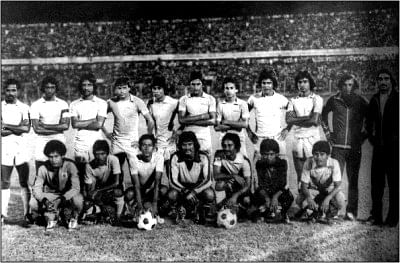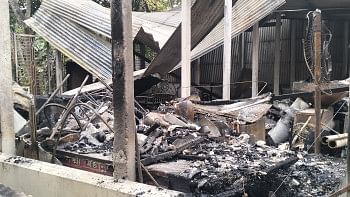The irreplaceable Nannu

IN HIS HEYDAY: Monwar Hossain Nannu (4th from R, back row), in Abahani colours, poses for a team photograph before the start of a Dhaka league match at the Dhaka Stadium, now Bangabandhu National Stadium, in 1977. PHOTO: COURTESY
It was at around two in the afternoon yesterday when a small crowd gathered just in front of the players' lounge at the Bangabandhu National Stadium. The audience, in a sombre mood, lined up one after another to show their last respect to someone whose white pair of boots, immaculate skills, sliding tackles and defence-splitting through passes enthralled millions on this very ground in the 1970s.
The man draped in all whites this time is none other than Monwar Hossain Nannu, who lost his long battle with colon cancer at around 8.30am on Saturday.
A complete footballer the country has ever produced, Nannu is just not a blast from the past but is a role model for any footballer of any generation.
Fits in any position except the role of a goalkeeper, he can be best described as the Franz Beckenbauer of Bangladesh.
For the Generation Y who has not seen him play, just imagine his sliding tackle on a hard ground and without little or no contact with his opponent, a measured pass through three opposing players and arguably the coolest head on a battlefield where tempers often flared. And if fashion has anything to do with a football player his long hair was a symbol of the 70s and early 80s.
After making his Dhaka League debut for Wari Club in 1969, the midfield general joined Mohammedan Sporting Club after the War of Liberation. But his association with Abahani from 1974 to 1982 was no doubt the best times of our country's football that also saw fierce rivalry of Abahani and Mohammedan. Interestingly, it was also the time when brothers turned into rivals with his younger brother Shamsul Haq Monju manning the Mohammedan fort.
A true leader in every aspect, Nannu played a big role in rebuilding Abahani after the dark episode of 1975.
He donned his first national cap in 1973 when Bangladesh played the Mardeka Cup. Unfortunately, it was his only foreign trip that could have been avoided had he not first be picked and then dropped as national captain for the Bangkok Asian Games in 1978. He was so popular among his teammates that seven Abahani players picked for the national team refused to join in protest of the decision and was subsequently banned. Kazi Salauddin, who does not need an introduction, was one of those players who expressed his loyalty to Nannu.
“I want to look at the bright side. It proved united we were as players. He is the finest midfielder of Bangladesh. His precision pass could find the gap through three players. He had the ability to attack from defence. He was a master tactician,” said Salahuddin about his Abahani and national teammate for nearly a decade.
Dewan Shafiul Arefin Tutul, who grew in the shadow on Nannu and later turned into one of the best right-back, dubbed him as a role model.
“He was a complete footballer. I have not seen a cool head like him when the going gets tough. It was a testing time for him in 1987 when he was leading Abahani against Mohammedan with Monju (his brother) at the other end. To be honest, he inspired us at that time,” recalled Tutul.
The scene before that Mohammedan-Abahani clash in 1987 is history now with Nannu even refusing to shake hands with his brother.
There was also no handshake this time around when he said his final goodbye to his followers.

 For all latest news, follow The Daily Star's Google News channel.
For all latest news, follow The Daily Star's Google News channel. 



Comments